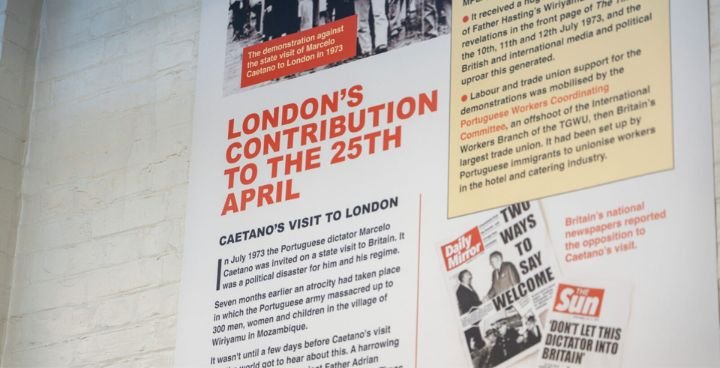‘Viva o 25 de Abril de 1974’: Exhibition celebrates 50th anniversary of the fall of fascism in Portugal
On April 25, 1974, a military coup toppled the Portuguese prime minister, Dr Marcello Caetano, after almost 50 years of dictatorial rule.
A new exhibition, Viva o 25 de Abril de 1974, has opened in Lambeth to explore an important chapter in the history and heritage of the Portuguese-speaking world.
The exhibition is showing at Lambeth council’s Tate South Lambeth Library in South Lambeth Road, in the heart of what is known as ‘Little Portugal’ because of its significant Portuguese-speaking community.
Lambeth has the biggest Portuguese-speaking community in the UK.
The new exhibition is part of a series of events at the library celebrating the 50th Anniversary of the fall of the Fascist regime in Portugal in April 1974.
By 1974, Portugal was in its 13th year of fighting a colonial war on three African fronts. The ultra-nationalist Estado Novo regime had sunk into using unjustifiable levels of manpower in a desperate attempt to maintain control.

As the war dragged on, the Portuguese military’s flailing attempts to top up its officer pool were met with a backlash from junior staff officers, who began organising among themselves.
The internal opposition quickly grew into an organised politicised force: the Movement of Captains.
The Captains believed the war could be ended by political means and that the armed forces had to be brought back in line with the will of the Portuguese people.
By April, plans to topple the regime were well under way, coordinated by Maj Otelo Saraiva de Carvalho.
The group organised to signal the beginning of the coup through a radio station, Lisbon Associated Broadcasters, which played the song E Depois do Adeus.
Less than 24 hours after the signal was aired, the oldest fascist dictatorship in Europe had fallen and Portugal’s transition to democracy, the Carnation Revolution had begun.
The revolution was named after people spontaneously flooded the streets, offering flowers to soldiers.

Community members from Migrantes Unidos, helped by Bill Mayblin, a retired graphic designer who volunteered his services, conducted extensive research to create and design the contents of the exhibition.
Migrantes Unidos is a group of migrants, ex-migrants and descendants of Portuguese migrants in the UK fighting against injustice, austerity and social inequality.
Alvaro de Miranda, who curated the exhibition, said: “I am delighted that Lambeth council and Lambeth Library Services have agreed to sponsor and provide the space for this exhibition in Tate South London Library, in the heart of “Little Portugal”.
“It is essential that the Portuguese-speaking communities, particularly the younger generations that did not experience fascism in Portugal and Portuguese colonialism in Africa, learn from their history to help ensure that such a tragedy isn’t repeated.”
Tate South Lambeth Library in South Lambeth Road is open on Mondays, Wednesdays, Thursdays, Fridays and Saturdays between 10am and 6pm.
For more information, visit Tate South Lambeth Library.
Pictured top: Viva o 25 de Abril de 1974 at Tate South Lambeth Library (Picture: Lambeth council)
